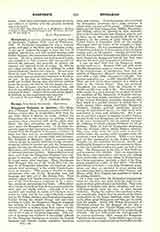

Humphreys, LAURENCE, layman and martyr, born in Hampshire, England, 1571; died at Winchester, 1591. Of Protestant parentage, he was a studious youth, well read in the Bible and in religious works. At the age of eighteen he sought to enter the lists of religious controversy and had several meetings with Father Stanney, who soon succeeded in making him a convert. He was a virtuous and good-hearted youth, who delighted to visit prisoners and sick persons, to instruct the ignorant, and generally to exercise the corporal and spiritual works of mercy. In 1591 he was taken seriously ill, and in his delirium he called Queen Elizabeth a harlot and a heretic. He was over-heard by some Protestants, and before he was quite convalescent was arrested and committed to Winches-ter jail. At his trial he solemnly averred that he could not recollect having used opprobrious epithets about the queen, but that he did not dispute the evidence of the witnesses who had overheard him, and that he was willing to suffer for his words, though unconscious of them. And for these words alone, spoken in delirium, he was condemned and executed.
C. F. WEMYSS BROWN

